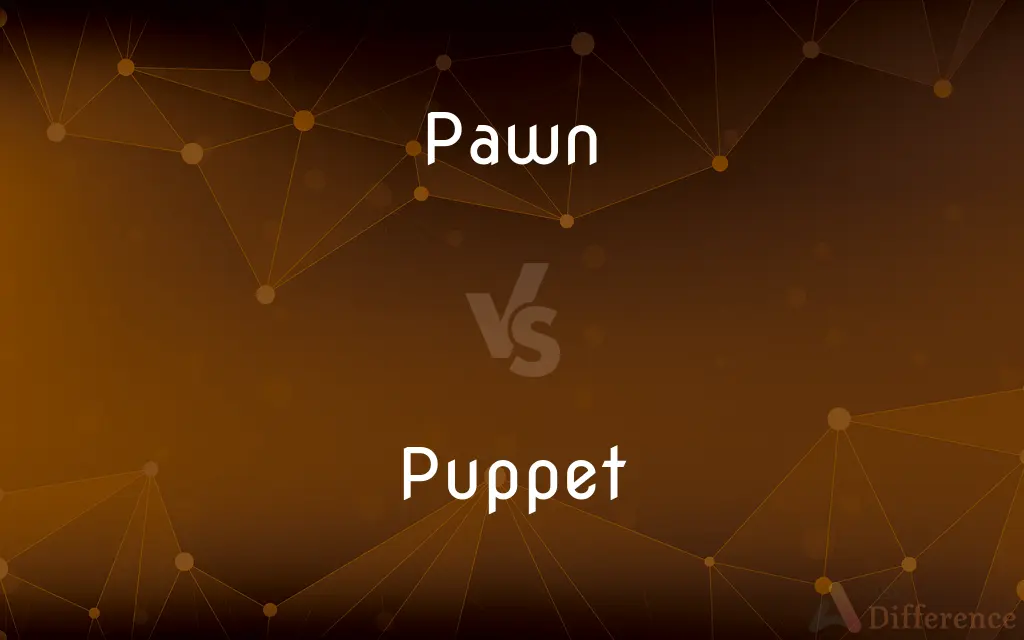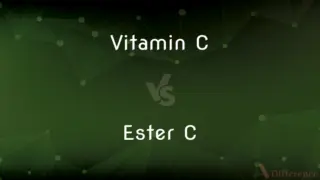Pawn vs. Puppet — What's the Difference?
Edited by Tayyaba Rehman — By Fiza Rafique — Published on November 12, 2023
Pawn is a person or entity manipulated or used to further another's purpose. Puppet is an individual, group, or entity controlled by an external force or influence.

Difference Between Pawn and Puppet
Table of Contents
ADVERTISEMENT
Key Differences
Pawn embodies a figure or entity utilized in the games of higher powers, often without realizing it, offering its service mostly unknowingly. In comparison, a Puppet, while also utilized by others, tends to signify a higher degree of control, often illustrating a string-pulling image where every action is governed by the puppeteer.
Pawns might have a level of autonomy, sometimes making decisions that seem independent, although they ultimately serve another’s objectives. On the other hand, Puppets typically represent a stark lack of autonomy, with decisions and actions heavily, and often visibly, influenced or orchestrated by an external party.
Pawns may or may not realize that they are being utilized for wider purposes and may still act according to their preferences within specific bounds. Puppets are, metaphorically speaking, bound to the will of the puppeteer, with their actions being explicit extensions of another's will.
While a Pawn can sometimes shift the course of the game if strategically positioned, its movements are fundamentally bound by predetermined rules. In contrast, a Puppet’s movements and expressions are unlimited yet are explicitly defined by the controller, reflecting a comprehensive, overt manipulation.
Comparison Chart
Control
Partial or indirect
Direct and complete
ADVERTISEMENT
Awareness
May be unaware
Typically unaware
Autonomy
Limited autonomy possible
Nearly non-existent
Manipulation
Subtle
Overt
Role in Strategy
Expendable
Directly controlled tool
Compare with Definitions
Pawn
Pawn can indicate a person used by others for their purposes.
He realized he was merely a Pawn in their political game.
Puppet
A puppet might indicate something that is artificially operated or moved.
The Puppet bird tweeted mechanically from its perch in the clock.
Pawn
A pawn can refer to a chess piece of the smallest size and value.
He moved his Pawn forward two squares to open the game.
Puppet
A puppet refers to a movable model of a person or animal manipulated by strings or a hand inside it.
The puppet show fascinated the children, each Puppet dancing lively on the stage.
Pawn
A pawn might refer to someone who is easily manipulated.
He became a Pawn in their elaborate scam, completely oblivious to the deception.
Puppet
A puppet could signify an imitation or copy that is being controlled.
The Puppet program merely mimicked the more successful initiatives of its competitors.
Pawn
Something given as security for a loan; a pledge or guaranty.
Puppet
Puppet could represent an entity manipulated to provide a semblance of legitimacy to deceitful acts.
The Puppet government was installed to mask the tyranny of the military coup.
Pawn
The condition of being held as a pledge against the payment of a loan
Jewels in pawn.
Puppet
Puppet can describe a person, party, or state under the control of another.
The supposed leader was merely a Puppet of the powerful cartel.
Pawn
A person serving as security; a hostage.
Puppet
A small figure of a person or animal, having a cloth body and hollow head, designed to be fitted over and manipulated by the hand.
Pawn
The act of pawning.
Puppet
A figure having jointed parts animated from above by strings or wires; a marionette.
Pawn
Abbr. P(Games) A chess piece of lowest value that may move forward one square at a time or two squares in the first move, capture other pieces only on a one-space diagonal forward move, and be promoted to any piece other than a king upon reaching the eighth rank.
Puppet
A toy representing a human figure; a doll.
Pawn
A person or an entity used to further the purposes of another
An underdeveloped nation that was a pawn in international politics.
Puppet
One whose behavior is determined by the will of others
A political puppet.
Pawn
To give or deposit (personal property) as security for the payment of money borrowed.
Puppet
Any small model of a person or animal able to be moved by strings or rods, or in the form of a glove.
Pawn
To risk; hazard
Pawn one's honor.
Puppet
(figuratively) A person, country, etc, controlled by another.
Pawn
(chess) The most numerous chess piece, or a similar piece in a similar game. In chess, each side starts with eight; moves are only forward, and attacks are only diagonally or en passant.
Puppet
(obsolete) A poppet; a small image in the human form; a doll.
Pawn
(figurative) Someone who is being manipulated or used to some end.
Though a pawn of the gods, her departure is the precipitating cause of the Trojan War.
Puppet
(engineering) The upright support for the bearing of the spindle in a lathe.
Pawn
(uncountable) The state of being held as security for a loan, or as a pledge.
All our jewellery was in pawn by this stage.
Puppet
A small image in the human form; a doll.
Pawn
An instance of pawning something.
Puppet
A similar figure moved by the hand or by a wire in a mock drama; a marionette; a wooden actor in a play.
At the pipes of some carved organ move,The gilded puppets dance.
Pawn
An item given as security on a loan, or as a pledge.
Puppet
One controlled in his action by the will of another; a tool; - so used in contempt.
Pawn
(rare) A pawnshop; pawnbroker.
Puppet
The upright support for the bearing of the spindle in a lathe.
Pawn
A gallery.
Puppet
A small figure of a person operated from above with strings by a puppeteer
Pawn
To pledge; to stake or wager.
Puppet
A person who is controlled by others and is used to perform unpleasant or dishonest tasks for someone else
Pawn
To give as security on a loan of money; especially, to deposit (something) at a pawn shop.
Puppet
A doll with a hollow head of a person or animal and a cloth body; intended to fit over the hand and be manipulated with the fingers
Pawn
See Pan, the masticatory.
Pawn
A man or piece of the lowest rank.
Pawn
State of being pledged; a pledge for the fulfillment of a promise.
Redeem from broking pawn the blemish'd crown.
As the morning dew is a pawn of the evening fatness.
Pawn
A stake hazarded in a wager.
My life I never held but as a pawnTo wage against thy enemies.
Pawn
To give or deposit in pledge, or as security for the payment of money borrowed; to put in pawn; to pledge; as, to pawn one's watch.
And pawned the last remaining piece of plate.
Pawn
To pledge for the fulfillment of a promise; to stake; to risk; to wager; to hazard.
Pawning his honor to obtain his lust.
Pawn
An article deposited as security
Pawn
A person used by another to gain an end
Pawn
(chess) the least powerful piece; moves only forward and captures only to the side; it can be promoted to a more powerful piece if it reaches the 8th rank
Pawn
Borrowing and leaving an article as security for repayment of the loan
Pawn
Leave as a guarantee in return for money;
Pawn your grandfather's gold watch
Pawn
To pawn signifies to pledge or leave an item with a pawnbroker as security for money lent.
In desperate need of cash, she decided to Pawn her necklace.
Pawn
Pawn can describe an item left as security for money lent.
The old guitar sat in the shop, a forgotten Pawn from a previous loan.
Common Curiosities
Is a Puppet always visibly controlled?
Typically, a Puppet implies visible or transparent manipulation, where actions are evidently not self-directed.
How does a Puppet relate to manipulation?
A Puppet metaphorically relates to an individual or entity that is being controlled or manipulated by an external influence.
What is a Pawn in chess?
A Pawn is a chess piece that is often considered to have the lowest value and has a specific, straightforward movement.
Can a person or entity be both a Pawn and a Puppet?
Conceptually, yes. A person can be a Pawn in one context (used strategically) and a Puppet (controlled) in another.
Are Puppets always literal figures being controlled by strings?
No, Puppet can metaphorically describe a person or entity controlled by another party, not just literal puppets.
Can a Pawn choose to stop being used?
If aware of the manipulation, theoretically, a Pawn could attempt to escape or resist the strategizing party.
Can a Pawn have power in strategic terms?
Yes, strategically utilized, a Pawn, especially in metaphoric or strategic contexts, can have significant impact.
Does a Puppet have any positive connotations?
Rarely in political or social contexts, but in entertainment, Puppets are positive, providing fun and amusement.
Can a Pawn be aware of its role?
A Pawn may or may not be aware that it's being used to further another's purpose, varying by context.
Can a Puppet become autonomous?
Metaphorically, a Puppet would need to sever ties with controlling influences to gain autonomy.
Can Pawn have non-negative connotations?
Not commonly. Pawn often implies being used, but in chess, for instance, it’s a neutral term.
Can pawning refer to a process?
Yes, pawning can refer to the act of leaving an item with a pawnbroker as security against money borrowed.
Can a Puppet act autonomously?
Generally, no. A Puppet typically acts under the control or influence of another entity.
Is a Puppet always negative in implication?
Often, yes. Puppet usually carries negative connotations of manipulation and lack of autonomy.
Share Your Discovery

Previous Comparison
Kung Pao vs. Szechuan
Next Comparison
Vitamin C vs. Ester CAuthor Spotlight
Written by
Fiza RafiqueFiza Rafique is a skilled content writer at AskDifference.com, where she meticulously refines and enhances written pieces. Drawing from her vast editorial expertise, Fiza ensures clarity, accuracy, and precision in every article. Passionate about language, she continually seeks to elevate the quality of content for readers worldwide.
Edited by
Tayyaba RehmanTayyaba Rehman is a distinguished writer, currently serving as a primary contributor to askdifference.com. As a researcher in semantics and etymology, Tayyaba's passion for the complexity of languages and their distinctions has found a perfect home on the platform. Tayyaba delves into the intricacies of language, distinguishing between commonly confused words and phrases, thereby providing clarity for readers worldwide.












































